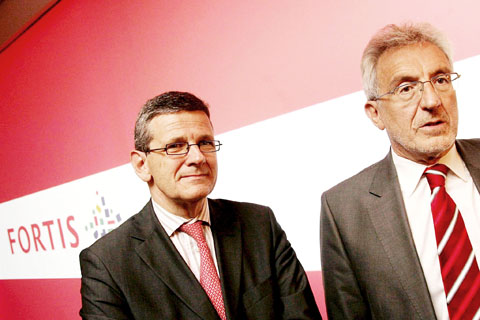The financial group Fortis said on Friday that it was replacing its chief executive as its shares fell more than 20 percent amid concerns about its liquidity.
Fortis said that Filip Dierckx, 52, who leads the banking unit, would succeed Herman Verwilst. Verwilst, who took over in July after the chief executive, Jean-Paul Votron, came under pressure for shouldering a large bill from the acquisition of a part of the Dutch bank ABN Amro just as the subprime mortgage market started to falter.
“Given his vast experience and knowledge of the company, we’re happy that Filip has accepted this challenging task,” Fortis group chairman Maurice Lippens said in a statement.

PHOTO: EPA
Fortis has been plagued by speculation about its liquidity problems, despite assurances from bank officials and politicians.
Earlier on Friday, Verwilst pledged that Fortis would not go bankrupt and said it could sell more noncore assets than previously foreseen to bolster its balance sheet.
Belgian political leaders including the finance minister, Didier Reynders, also rallied to its side, reassuring customers that bank deposits were guaranteed by the government.
Fortis shares fell sharply all week, leaving the bank’s market value on Friday at 12.2 billion euros (US$17.8 billion) — about a third of what it was at the start of the year.
That is far below the 24 billion euros Fortis paid when it, Royal Bank of Scotland and Banco Santander of Spain carved up ABN Amro just a few months before the current financial turmoil began.
Fortis said on Friday that customers had withdrawn about 3 percent of deposits since the start of the year.
The bank announced in June that it was seeking to raise 8.3 billion euros to maintain solvency goals as it absorbs the ABN Amro units, including consumer banking and asset management.
Verwilst said on Friday that the bank already had raised 3.1 billion euros, and had now identified assets worth up to 10 billion euros to help generate up to 5 billion euros of the remainder.
In June, Fortis had said it was only aiming to sell noncore assets worth about 2 billion euros.
Ivan Lathouders, an analyst with Bank Degroof in Brussels, said the 8.3 billion euros should be enough to keep the bank solvent.
But he warned that instability in the markets could lead to further falls in the bank’s share price. He also warned that more clients could withdraw their savings.
“No one really knows what will happen,” Lathouders said.
Some analysts said the tumbling value of shares in Fortis made it a takeover target.
“We see an increasing likelihood of an acquisition,” said Jaap Meijer, an analyst at Dresdner Kleinwort in London.
The most probable bidders, he said, would be BNP Paribas of France or the Dutch lender ING.
He also said that BNP and ING — instead of buying the bank — could purchase pieces of Fortis, like its private banking or its clearing and asset management units.

JITTERS: Nexperia has a 20 percent market share for chips powering simpler features such as window controls, and changing supply chains could take years European carmakers are looking into ways to scratch components made with parts from China, spooked by deepening geopolitical spats playing out through chipmaker Nexperia BV and Beijing’s export controls on rare earths. To protect operations from trade ructions, several automakers are pushing major suppliers to find permanent alternatives to Chinese semiconductors, people familiar with the matter said. The industry is considering broader changes to its supply chain to adapt to shifting geopolitics, Europe’s main suppliers lobby CLEPA head Matthias Zink said. “We had some indications already — questions like: ‘How can you supply me without this dependency on China?’” Zink, who also

The number of Taiwanese working in the US rose to a record high of 137,000 last year, driven largely by Taiwan Semiconductor Manufacturing Co’s (TSMC, 台積電) rapid overseas expansion, according to government data released yesterday. A total of 666,000 Taiwanese nationals were employed abroad last year, an increase of 45,000 from 2023 and the highest level since the COVID-19 pandemic, data from the Directorate-General of Budget, Accounting and Statistics (DGBAS) showed. Overseas employment had steadily increased between 2009 and 2019, peaking at 739,000, before plunging to 319,000 in 2021 amid US-China trade tensions, global supply chain shifts, reshoring by Taiwanese companies and

Taiwan Semiconductor Manufacturing Co (TSMC, 台積電) received about NT$147 billion (US$4.71 billion) in subsidies from the US, Japanese, German and Chinese governments over the past two years for its global expansion. Financial data compiled by the world’s largest contract chipmaker showed the company secured NT$4.77 billion in subsidies from the governments in the third quarter, bringing the total for the first three quarters of the year to about NT$71.9 billion. Along with the NT$75.16 billion in financial aid TSMC received last year, the chipmaker obtained NT$147 billion in subsidies in almost two years, the data showed. The subsidies received by its subsidiaries —

At least US$50 million for the freedom of an Emirati sheikh: That is the king’s ransom paid two weeks ago to militants linked to al-Qaeda who are pushing to topple the Malian government and impose Islamic law. Alongside a crippling fuel blockade, the Group for the Support of Islam and Muslims (JNIM) has made kidnapping wealthy foreigners for a ransom a pillar of its strategy of “economic jihad.” Its goal: Oust the junta, which has struggled to contain Mali’s decade-long insurgency since taking power following back-to-back coups in 2020 and 2021, by scaring away investors and paralyzing the west African country’s economy.